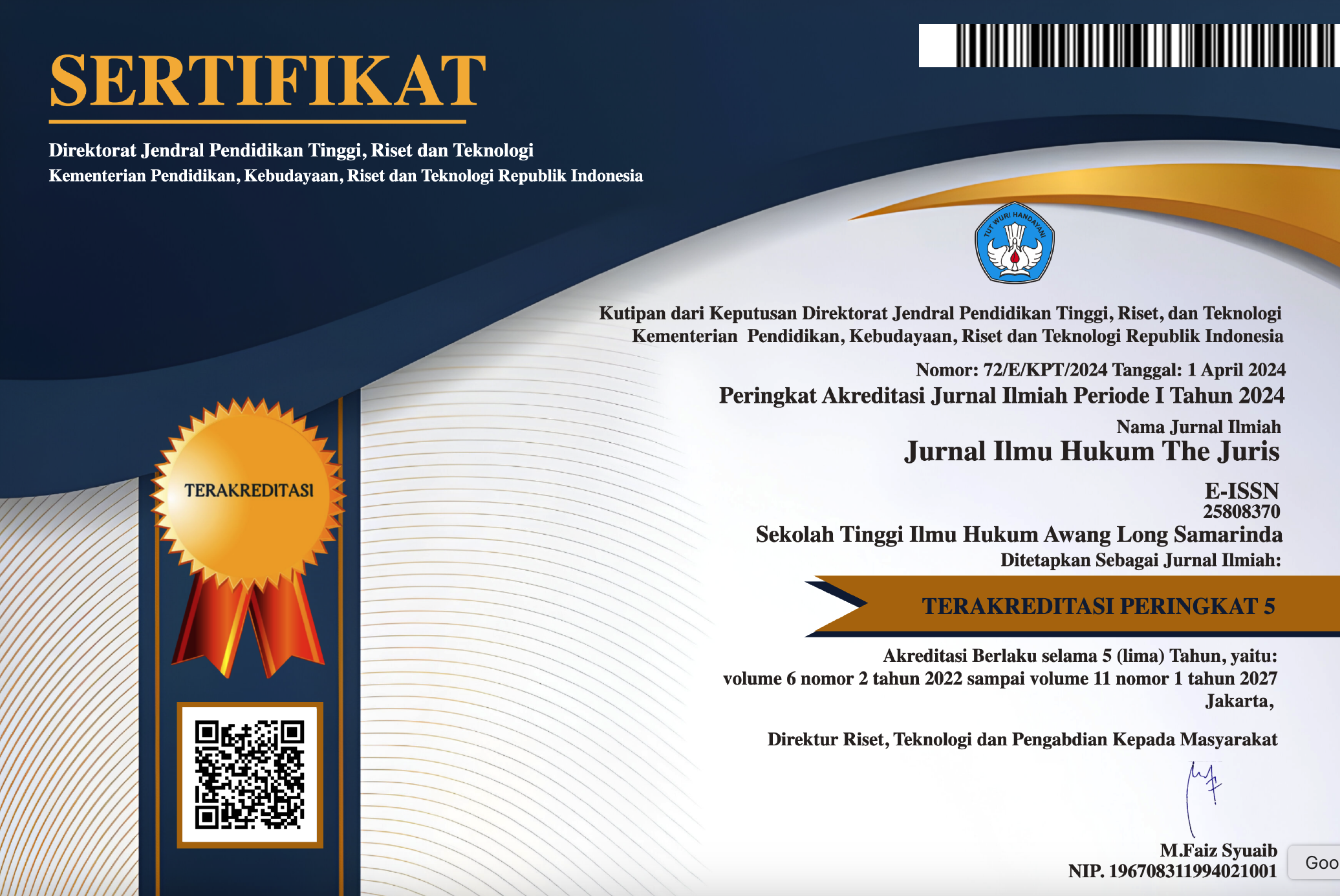POLRI SEBAGAI GARDA TERDEPAN DALAM PENEGAKAN HUKUM KORUPSI DIGITAL DI ERA TRANSFORMASI TEKNOLOGI
Abstract
Law continues to develop along with advances in information technology, influencing communication patterns and various aspects of people's lives. Although technology offers many solutions, it also presents challenges, especially in eradicating corruption, which increasingly involves digital data. Cyber security is very important in protecting data, especially those related to corruption crimes. In the digital era, corruption crimes are increasingly difficult to detect and uncover because perpetrators often use technology to evade law enforcement. Therefore, an effective approach is needed to ensure that perpetrators are arrested and prosecuted in accordance with applicable law. This research aims to analyze human resource management in the police environment as a strategy to overcome these challenges by improving human resource performance through a qualitative approach, where this type of research emphasizes processes and meanings that are not tested or measured precisely. This research uses a method where the materials studied in normative legal research are library materials or secondary data. Library materials consist of primary sources and secondary sources. Primary sources include: literature books, research reports, magazines, theses, dissertations, and patents. Meanwhile, secondary sources include: abstracts, indexes, bibliographies, government publications and other reference materials. with data in the form of descriptive data. To mitigate the negative impacts of digital technology, adequate awareness and understanding of the wise and safe use of technology is very important. Education and increasing awareness regarding the risks of digital technology is very important, both for individuals and society as a whole. The National Police of the Republic of Indonesia (Polri) has a major responsibility in enforcing the law against technology-related crimes, such as cybercrime, online fraud, dissemination of illegal content, and copyright violations. By strengthening existing regulations and increasing the capacity of the National Police in investigating and taking action Digital crime is expected to reduce corruption cases that utilize information and communication technology. Digital corruption is a big challenge in this digital era, which requires continuous efforts to deal with it.
Downloads
References
Abdullah, F. (2019). Fenomena Digital 4.0. Jurnal Dimensi DKV Seni Rupa Dan Desain, 8(1), 47–58.
Cici, J. (2024). Pencegahan dan Penanggulangan Korupsi Oleh Aparat Kepolisian Daerah Lampung. Moneter: Jurnal Ekonomi dan Keuangan, 2(4), 192-202.
Fuad, F., Dewi, A., & Munawar, S. (2022). The application of social philosophy in the era of revolution industry 4.0 in Indonesia. Borobudur Law Review, 4(1), 45–53. https://doi.org/10.31603/burrev.7137
Hengki Irawan, Z. H. (2024). Dampak Teknologi Terhadap Strategi Litigasi dan Bantuan Hukum : Tren dan Inovasi di Era Digital. Innovative: Journal Of Social Science Research Volume 4 Nomor 2 Tahun 2024 Page 4600-4613 E-ISSN 2807-4238 and P-ISSN 2807-4246 Website: Https://J-Innovative.Org/Index.Php/Innovative, 4, 4600–4613.
HERMAWAN, R. (2022). KEBIJAKAN PEMBANGUNAN HUKUM PEMBERANTASAN TINDAK PIDANA KORUPSI INDONESIA DI ERA REVOLUSI INDUSTRI 4.0 (Doctoral dissertation, Nusa Putra).
Ismail, M. (2023). Digital Policing ; Studi Pemanfaatan Teknologi Dalam Pelaksanaan Tugas Intelijen Kepolisian untuk Mencegah Kejahatan Siber (Cybercrime). Jurnal Ilmu Kepolisian, 17(3), 15. https://doi.org/10.35879/jik.v17i3.428
Kitab Undang-Undang Hukum Pidana
KIF Aminanto. (2017). Politik Hukum Pidana, Disparitas Putusan Hakim dalam Tindak Pidana Korupsi. Jember Katamedia.
Megawati, M., Rahman, S., & Razak, A. (2024). Implementasi Fungsi Kepolisian Selaku Penyidik Tindak Pidana Korupsi. Journal of Lex Philosophy (JLP), 5(2), 570-588.
Nawi, S. (2017). Penelitian Hukum Normatif Vesus Penelitian Hukum Empiris. PT. Umitoha Ukhuwah Grafika.
Panggabean, F., Ediwarman, E., Sunarmi, S., & Marlina, M. (2024). Kebijakan Kriminal Dalam Penegakan Hukum Tindak Pidana Peredaran Narkotika Era Digital di Kota Medan. Locus Journal of Academic Literature Review, 3(2), 173-183.
Pratama, W. A. (2024). Penegakan Hukum Terhadap Korupsi di Era Modernisasi Digital. SEIKAT: Jurnal Ilmu Sosial, Politik Dan Hukum, 3(1), 91–104. https://doi.org/10.55681/seikat.v3i1.1227
Rahman, F. (2024). Tumpang Tindih Kewenangan Penyidikan Korupsi: Polisi, Jaksa, Dan KPK Dalam UU No. 19 Tahun 2019. Tumpang Tindih Kewenangan Penyidikan Korupsi: Polisi, Jaksa, Dan KPK Dalam UU No. 19 Tahun 2019, (31), 1-31.
Salsabila, P. A., & Shinda Zahra Gelista, S. (2024). EFEKTIVITAS WEWENANG POLISI DALAM MENANGANI TINDAK PIDANA KORUPSI DI INDONESIA. JOURNAL OF LAW AND NATION, 3(3), 510-516.
Santiadi, K. (2019). Expanding Access To Justice Through E-Court In Indonesia. Prophetic Law Review, 1(1). https://doi.org/10.20885/plr.vol1.iss1.art5
Sariani, A. L. (2024). Efektivitas Penegakan Hukum Terhadap Kejahatan Siber di Indonesia. 2(2). https://ejournal.indrainstitute.id/index.php/al-dalil/index
Sujana, I. G., & Kandia, I. W. (2024). Indikator Lemahnya Penegakan Hukum di Indonesia. IJOLARES: Indonesian Journal of Law Research, 2(2), 56-62.
Sunggara, M. A., Meliana, Y., Hidaya, W. A., Nain, S., & Fatma, M. (2024). Dinamika Hukum Dan Korupsi Politik (Dampak Dan Tantangan Penegakan Hukum Di Indonesia). Unizar Law Review, 7(1), 35-48.
Tuntalanai, M. A. (2023). Digital Guna Mendukung Kamdagri Dalam. LEMBAGA KE(KERTAS KARYA ILMIAH PERSEORANGAN (TASKAP) PROGRAM PENDIDIKAN REGULER ANGKATAN (PPRA) LXV LEMHANNAS RI).
Undang Undang Dasar Negara Republik Indonesia Tahun 1945
Undang-Undang Nomor 20 Tentang Perubahan Atas Undang-Undang Nomor 31 Tahun 1999 Tentang Pemberantasan Tindak Pidana Korupsi.
Undang-Undang Nomor 31 Tahun 1999 Tentang Pemberantasan Tindak Pidana Korupsi
Wirakusuma, M. A. (2022). The E-Aspiration System as an Implementation of Public Participation from the Good Governance Perspective. Varia Justicia, 18(3), 248–258. https://doi.org/10.31603/variajusticia.v18i3.8822
Zahira, Z. H., Halik, A. R. A., & Bangun, M. F. A. (2024). PERAN DAN TANTANGAN WEWENANG KEPOLISIAN DALAM PENEGAKKAN HUKUM DI INDONESIA. Jurnal Ilmiah Multidisiplin Terpadu, 8(6).
Copyright (c) 2024 Donal Afriansyah, Aryan Torrido

This work is licensed under a Creative Commons Attribution-ShareAlike 4.0 International License.







